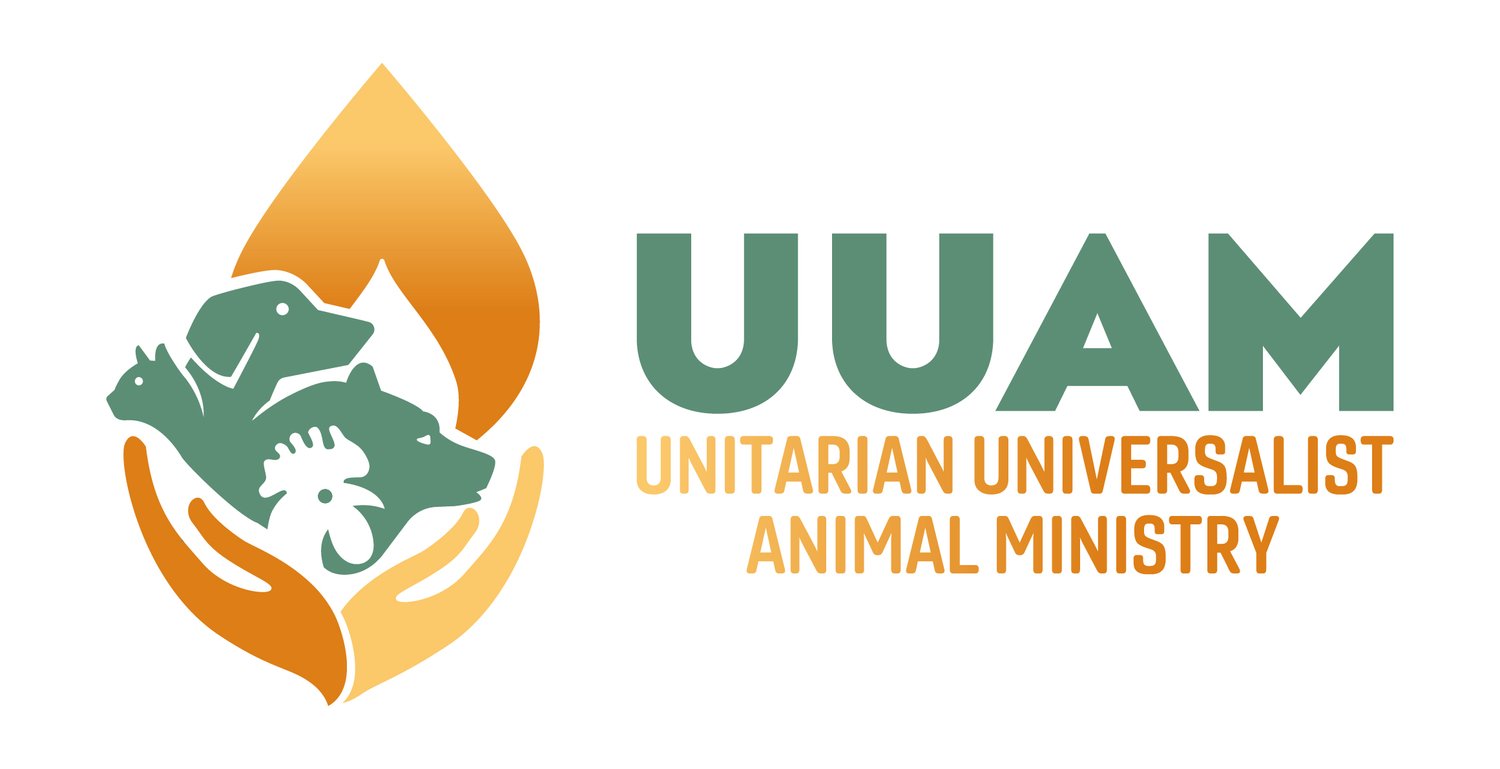Executive Director’s Letter
A rescued cow nuzzles Executive Director Rev. John Gibb Millspaugh at a farmed animal sanctuary. Photo: Beth Redwood
There have always been social justice leaders among us who invited all Unitarians and Universalists to put the humane impulse into greater action, just as you and I seek to be such leaders now and in the decades ahead.
The first Universalist activist for animals was Judith Sargent Murray. Judith and her husband, Rev. John Murray, transplanted Universalism from England to the United States. Judith Murray was one of the first American proponents of the idea of the equality of the sexes, and party to the first judicial ruling in America for freedom of religion. In 1793 she published an article titled “On the Rights [!] of Living Creatures to be Free from Harm by Humankind.” The Murrays’ congregant John Murray Spear (christened by Rev. Murray and named in his honor) later became a Universalist minister, organized the first Universalist anti-slavery convention, petitioned for women’s rights and against the death penalty, and wrote articles promoting the humane treatment of animals. In 1837, Unitarian minister Charles Lowell preached the first full sermon in the United States against cruelty to animals.
Unitarian Henry Bergh founded the American Society for the Prevention of Cruelty to Animals, or ASPCA, in 1866; it was North America’s first organization devoted to animals’ humane treatment. Bergh’s relentless activism against live pigeon shoots, a popular sport of the time, led to the development of the clay pigeon — now known as skeet. Soon Unitarian poet Henry Wadsworth Longfellow lauded Bergh as “the friend of every friendless beast.” Progressive Universalist editor of the New York Tribune Horace Greeley lent the support of his name to the ASPCA; Louisa M. Alcott, Unitarian author of Little Women, regularly wrote for the ASPCA’s newsletter; Unitarian minister and transcendentalist essayist Ralph Waldo Emerson served as honorary vice president of the Massachusetts chapter. Emerson’s disciple Henry David Thoreau, an occasional vegetarian, wrote in Walden that humanity “can and does live, in great measure, by preying on other animals; but this is a miserable way—as anyone who will go to snaring rabbits, or slaughtering lambs, may learn… Whatever my own practice may be, I have no doubt that it is part of the destiny of the human race, in its gradual improvement, to leave off eating animals.”
Unitarian and Universalist congregations played key roles in founding of SPCAs across the country, publicly affirming the three beliefs Bergh tirelessly promoted (see if you still agree with them):
When a person abuses (or enables the abuse of) an animal, the person is in the wrong and the animal is in the right;
Cruelty of any kind not only harms its victim, but corrodes and debases those who are aware of it yet stand by doing nothing;
Any morally progressive reform smooths the path for all other areas of our moral progress.
In living demonstration of that final point, when Bergh saw his success with animal concerns in New York, and New York’s failure to adequately protect an abused and neglected child named Mary Ellen, he rescued her from abuse himself and formed an organization modeled on the ASPCA: the American Society for the Prevention of Cruelty to Children.
Perhaps the most impressive achievement for animals by Unitarians and Universalists—so far—was accomplished by the “Apostle of Mercy,” Unitarian minister Rev. Thomas Timmins. According to historian Lewis G. Regenstein, Timmins set up “what appears to be the first mass effort in America to teach kindness to animals” (footnote 3). The result? Almost a quarter million members, organized into three and a half thousand “Bands of Mercy,” all swearing the oath “to be kind to harmless living creatures and TRY to protect them from cruel usage.” Imagine how taking that oath seriously would change our daily behavior in our own age. Universalist suffragist Olympia Brown, the first fully ordained woman of any denomination in our country, called the Bands of Mercy “the quickest and smartest bit of good work I ever saw done.”
Our religious ancestors who asked what it would mean to put the humane impulse into action for animals in their time are more than I can list, known and unknown, remembered and forgotten. Animal advocacy may feel like a relatively new issue, but many in our movement have worked on interrelated justice issues—including animal issues—for centuries. Today, in congregations across the world, Unitarian Universalists carry on this legacy. Thank you for being part of UUAM.
Please consider prioritizing UUAM in your charitable donations, so that we might be better equipped to carry this work forward in the decades to come. Please donate today.
For more about how to involve your own faith community in this topic, contact us.
Yours in faith,
Rev. John Gibb Millspaugh
Executive Director, UU Animal Ministry
Make a donation.
Please consider making a donation to help sustain our work well into the future.



